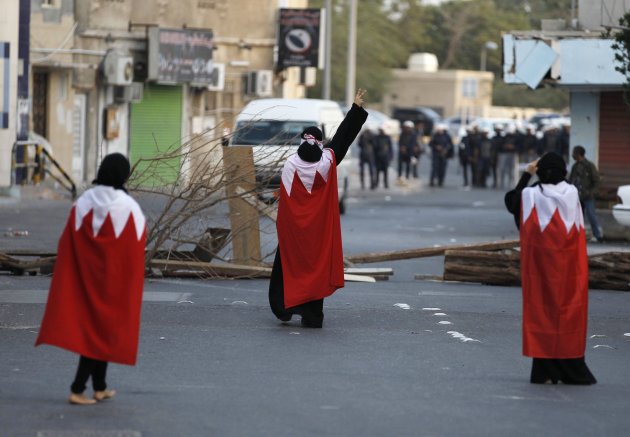 Deftly wielding his influence abroad, Bahrain’s King Hamad bin Isa Al Khalifa has managed to keep a low profile throughout the Arab revolutions. The island nation is fiercely guarded by Riyadh and Washington, an alliance with far-reaching benefits in the international community and media, and King Hamad’s image as a model reformer continues to stand on his “Independent Commission of Inquiry” (BICI). Months after rejecting Al Wefaq’s request for an observer mission, the Arab League's Nabil Al Arabi arrived just in time for Hamad’s “keynote speech” on Sunday.
Deftly wielding his influence abroad, Bahrain’s King Hamad bin Isa Al Khalifa has managed to keep a low profile throughout the Arab revolutions. The island nation is fiercely guarded by Riyadh and Washington, an alliance with far-reaching benefits in the international community and media, and King Hamad’s image as a model reformer continues to stand on his “Independent Commission of Inquiry” (BICI). Months after rejecting Al Wefaq’s request for an observer mission, the Arab League's Nabil Al Arabi arrived just in time for Hamad’s “keynote speech” on Sunday.The King has no reason to fear the Saudi-bankrolled Gulf Cooperation Council (GCC), whose Peninsula Shield was deployed in March to “protect” the monarchy from an “Iranian uprising.”
While their role hasn’t changed for hundreds of years, political allies are essential to surviving a revolution in the 21st century. They supply material and financial aid (arms, oil, cash) when needed, limit international condemnation, manipulate foreign organizations, block hostile measures and orchestrate media campaigns. However no government is immune to the publicity of killing its own people. Here the King has excelled beyond his unstable counterparts - Mubarak, Gaddafi, al-Assad and Saleh - by abstaining from their mechanized assaults. Instead the monarchy has played to its strengths by mobilizing its police force, deploying non-lethal tactics, recruiting ex-soldiers and police from friendly states (Pakistan, Jordan, UAE), and calling in armor from Riyadh.
As a result Bahrain has witnessed the lowest number of casualties amongst the sustained uprisings - more people were killed during a single day of Libya or Syria’s initial protests. This low-intensity strategy is King Hamad’s “key” to masking his presence on the international radar.
What this strategy won’t accomplish is the absolute suppression of death, injury and the desire for political freedom. The last 72 hours have produced two murky deaths, one a 24-year old found on the reclaimed Amwaj islands. Bahrain’s Interior Ministry denied any knowledge of the case, saying that an autopsy concluded death by drowning. Al Wefaq released an opposing version of Yousif Ahmed Abbas’s final hours, claiming that his parents were notified by authorities after his detainment. They suspect that he was tortured.
Bahrain’s Interior Ministry promptly responded, "The father of the missing man stated that his son suffered from psychological problems, sometimes going to the beaches in the area and requiring assistance in returning home.”
Apparently “psychological problems” serves as this weekend’s special excuse. Challenging the circumstances of each death, Bahrain’s government places the burden of responsibility on protesters rather than national and foreign security units. The same goes for funerals, which are “legitimately” dispersed after they evolve into anti-government rallies. On Saturday a 59-year old woman succumbed to burns inflicted when she lit herself on fire. One Gulf report said the woman “suffered from psychological problems,” but local sources claim that she had “fallen ill” after her son’s arrest in April. He was still being held when she self-immolated on her roof.
Bahrain’s media blackout can only minimize these cases, not hide them completely. Nor can an information campaign disperse Bahrain’s opposition movement on the ground - Al Wefaq has simply turned the international community’s inaction into a central theme. On Tuesday thousands of protesters flocked to the UN’s office in Manama, where security forces allowed them to rally under the alleged specter of U.S. criticism. A more likely explanation: King Hamad realized the counter-productively of attacking a demonstration in the UN’s presence. U.S. officials expressed polite concern over the beating of Nabeel Rajab, head of Bahrain’s Center For Human Rights (BCHR), and the Obama administration immediately returned to the familiar silence that greets protesters on a daily basis.
Al Wefaq also dismissed a recent trial of two Pakistani policemen accused of “beating to death” Ali al-Saqer and Zakeriya al-Asheeri. “Torture is not just systematic,” the group said in a statement. “It is now a policy of the state.”
Undaunted, Al Wefaq held a “No Withdrawal” protest in Manama on Friday to express its determination and rally new supporters. Former parliamentarian Mattar Ebahim said authorities injured at least 13 people when they attempted to disperse the crowd with tear gas, batons, stun grenades and sound bombs. Like the horror stories from Egypt’s November clashes, Ebahim claims that police are “targeting the protesters directly with tear gas canisters.” Several of the latest deaths have been attributed to injuries sustained from U.S.-made gas canisters.
None of these events are truly “mysterious.” All are products of Bahrain’s political marginalization, security crackdown and media blackout - the hardware and software of oppression.

No comments:
Post a Comment